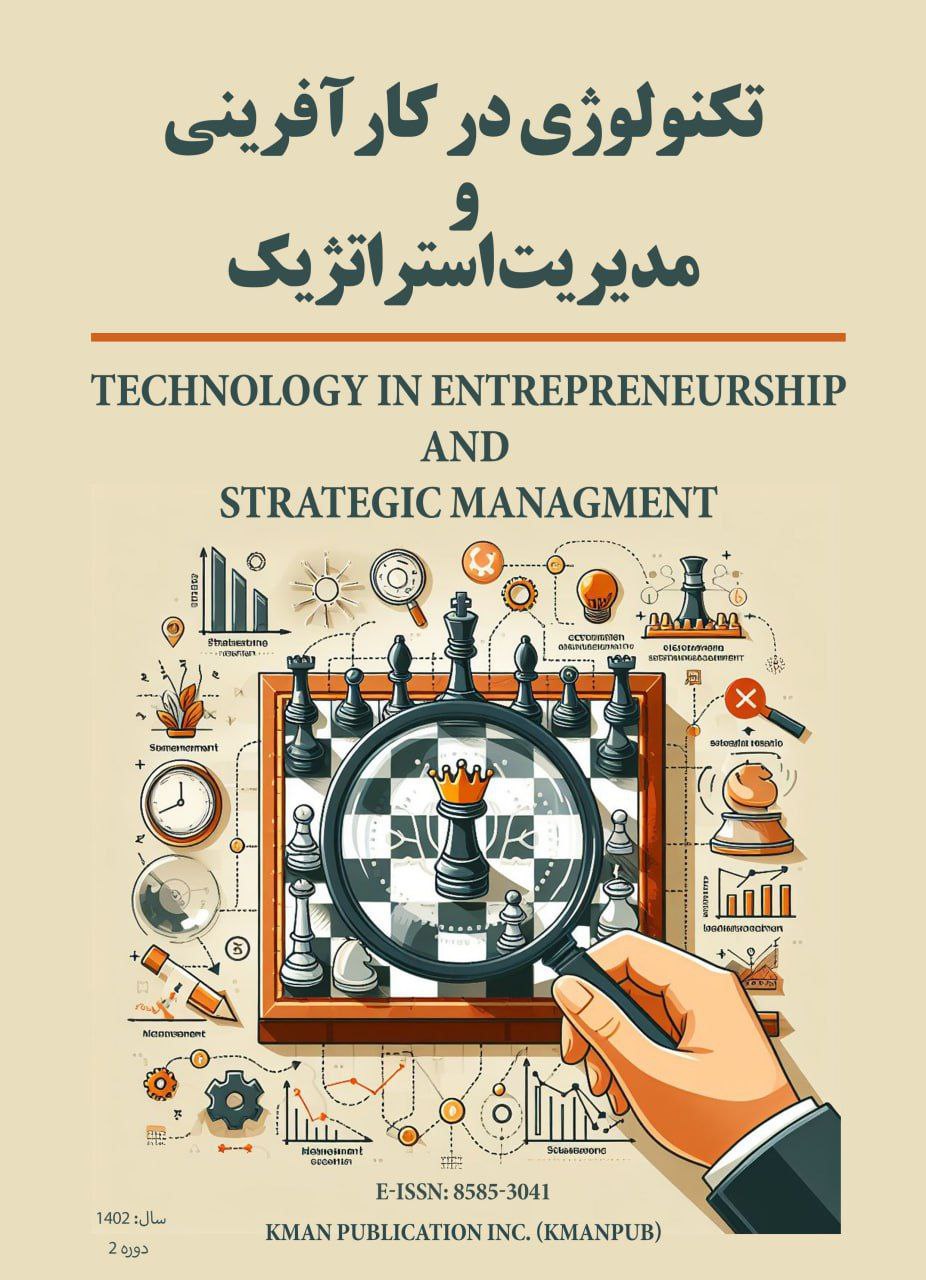Presenting an Optimization Model for Fintech Based on Artificial Intelligence Indices in the Financial Market
Keywords:
Fintech, Artificial Intelligence, Financial Market, Non-dominated Sorting Genetic Algorithm (NSGA-II)Abstract
The aim of this research is to present an optimization model for fintech based on artificial intelligence indices in the financial market. This research is exploratory in nature due to the model presentation and is considered applied since its results are utilized by stakeholders. The Non-dominated Sorting Genetic Algorithm II (NSGA-II) was employed as a metaheuristic method to solve nine problem simulations. The results obtained from this method were then compared with the epsilon-constraint method, and the relationship between the solutions indicated that the developed NSGA-II algorithm is capable of reaching appropriate solutions in a shorter time compared to the epsilon-constraint method, particularly for large-scale problem tests. The outcomes from solving the proposed mathematical model through the presented nine problem simulations were solved using the specified algorithms in GAMS and MATLAB software. The model considered in this research is a bi-objective model aimed at minimizing inter-cell movements and fintech purchases (cell formation) and maximizing the relationships of AI operators with network considerations and operator efficiency on fintechs (operator allocation). This model not only improves the efficiency of fintechs but also provides a novel and effective approach to adapting to various challenges in the financial market. Therefore, utilizing this optimization model can enhance performance and profitability in the financial market and contribute to development and progress in the financial space.
Downloads
References
Abad-Segura, E., González-Zamar, M.-D., López-Meneses, E., & Vázquez‐Cano, E. (2020). Financial Technology: Review of
Trends, Approaches and Management. Mathematics, 8(6), 951. https://doi.org/10.3390/math8060951
Abdul-Rahim, R., Bohari, S. A., Aman, A., & Awang, Z. (2022). Benefit–Risk Perceptions of FinTech Adoption for
Sustainability From Bank Consumers’ Perspective: The Moderating Role of Fear of COVID-19. Sustainability, 14(14),
https://doi.org/10.3390/su14148357
Abuzov, A. Y. (2023). The Role of Technological Innovations in Institutional Regulation of the Financial Capital Market. E3s
Web of Conferences, 376, 05047. https://doi.org/10.1051/e3sconf/202337605047
Al-Okaily, M., Alkhwaldi, A. F., Abdulmuhsin, A. A., Alqudah, H., & Al-Okaily, A. (2022). Cloud-Based Accounting
Information Systems Usage and Its Impact on Jordanian SMEs’ Performance: The Post-Covid-19 Perspective. Journal of
Financial Reporting and Accounting, 21(1), 126-155. https://doi.org/10.1108/jfra-12-2021-0476
Aloulou, M. (2023). Does FinTech Adoption Increase the Diffusion Rate of Digital Financial Inclusion? A Study of the Banking
Industry Sector. Journal of Financial Reporting and Accounting, 22(2), 289-307. https://doi.org/10.1108/jfra-05-2023-
Bandyopadhyay, P. (2022). A Study on Integration of Applied Artificial Intelligence in Accounting, Finance, Insurance, and
E-Commerce Sectors. Multimedia Research, 5(2), 15-19. https://doi.org/10.46253/j.mr.v5i2.a3
Belanche, D., Casaló, L. V., & Flavián, C. (2019). Artificial Intelligence in FinTech: Understanding Robo-Advisors Adoption
Among Customers. Industrial Management & Data Systems, 119(7), 1411-1430. https://doi.org/10.1108/imds-08-2018-
Deng, X., Huang, Z., & Xiang, C. (2019). FinTech and Sustainable Development: Evidence From China Based on P2P Data.
Sustainability, 11(22), 6434. https://doi.org/10.3390/su11226434
Dunis, C. L., Middleton, P. W., Karathanasopolous, A., & Theofilatos, K. (2016). Artificial Intelligence in Financial Markets.
https://doi.org/10.1057/978-1-137-48880-0
El-Said, H. M. (2021). A Review of Literature Directions Regarding the Impact of Fintech Firms on the Banking Industry.
Qualitative Research in Financial Markets, 15(5), 693-711. https://doi.org/10.1108/qrfm-10-2020-0197
Kazachenok, O. P., Stankevich, G. V., Chubaeva, N. N., & Tyurina, Y. (2023). Economic and Legal Approaches to the
Humanization of FinTech in the Economy of Artificial Intelligence Through the Integration of Blockchain Into ESG
Finance. Humanities and Social Sciences Communications, 10(1). https://doi.org/10.1057/s41599-023-01652-8
Kini, A. N., & Basri, S. (2022). An Empirical Examination of Customer Advocacy Influenced by Engagement Behaviour and
Predispositions of FinTech Customers in India. F1000research, 11, 27. https://doi.org/10.12688/f1000research.74928.2
Lagna, A., & Ravishankar, M. N. (2021). Making the World a Better Place With Fintech Research. Information Systems
Journal, 32(1), 61-102. https://doi.org/10.1111/isj.12333
Rizinski, M., Peshov, H., Mishev, K., Chitkushev, L. T., Vodenska, I., & Trajanov, D. (2022). Ethically Responsible Machine
Learning in Fintech. IEEE Access, 10, 97531-97554. https://doi.org/10.1109/access.2022.3202889
Sheng, Y., Fu, K., & Liang, J. (2022). Construction of a Fundamental Quantitative Evaluation Model of the a-Share Listed
Companies Based on the BP Neural Network. Computational Intelligence and Neuroscience, 2022, 1-12.
https://doi.org/10.1155/2022/7069788
Utami, A. F., Ekaputra, I. A., & Japutra, A. (2021). Adoption of FinTech Products: A Systematic Literature Review. Journal
of Creative Communications, 16(3), 233-248. https://doi.org/10.1177/09732586211032092
Yeh, J.-Y., & Chen, C. H. (2020). A Machine Learning Approach to Predict the Success of Crowdfunding Fintech Project.
Journal of Enterprise Information Management, 35(6), 1678-1696. https://doi.org/10.1108/jeim-01-2019-0017
Zhou, M., & Zheng, X. (2021). Evaluation of the Development of Fintech-Served Real Economy Based on Fintech
Improvement. Discrete Dynamics in Nature and Society, 2021, 1-10. https://doi.org/10.1155/2021/4836933
Downloads
Published
Issue
Section
License
Copyright (c) 2023 Journal of Technology in Entrepreneurship and Strategic Management (JTESM)

This work is licensed under a Creative Commons Attribution-NonCommercial 4.0 International License.











